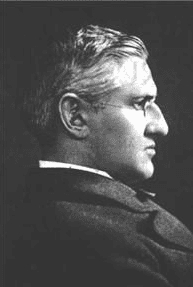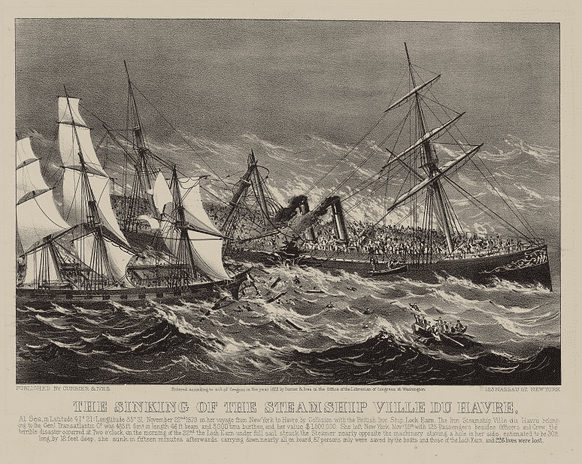Introduction: In this article, Gena Philibert-Ortega tells the moving story of how Horatio Gates Spafford wrote the famous hymn “It Is Well with My Soul” after undergoing severe hardships and tragedy. Gena is a genealogist and author of the book “From the Family Kitchen.”
Like many songs, the hymn “It Is Well with My Soul” was born out of personal experience.
When peace, like a river, attendeth my way,
When sorrows like sea billows roll;
Whatever my lot, Thou hast taught me to say,
It is well, it is well with my soul.
Its composer, Horatio Gates Spafford, was a Chicago lawyer who – although previously successful – had suffered setbacks when his considerable real estate investments were lost during the Great Chicago Fire of 1871. His finances took another hit during the Panic of 1873 financial crisis. After two rough years, he decided to alleviate some of his family’s stress by giving them a change of scenery.

Spafford Family Vacation
Plans were made for the family (including Horatio, his wife Anna, and their four daughters) to journey to Europe in November 1873 via the French iron steamship Ville du Havre. Horatio accompanied them to New York, but at the last minute had to change his plans because of a business obligation. He sent his family on ahead, promising to join them in time. Wife Anna and daughters Annie (b. 1862), Margaret Lee (b. 1864), Elizabeth (b. 1868), and Tanetta (b. 1871) set sail on November 15th.
His family never reached their destination – and he never saw his four daughters again.
Disaster at Sea
Ironically, the Ville du Havre’s captain – acting as confident as a familiar future captain on another “unsinkable” ship 39 years later – assured Anna Spafford and other passengers that his ship was very safe and the voyage would be an easy one. A week into the voyage, on 22 November 1873, the liner collided with the British clipper Loch Earn. Even as the ship was struck, sounding like an explosion according to passengers, the captain told everyone “it’s nothing, nothing.” As the ship began to take on water, the crew assured passengers that the ship was too safe to sink.*
But they were wrong; the Ville du Havre sank in just 12 minutes, killing an estimated 226 people – including all four of the Spafford daughters. Anna survived the shipwreck by clinging to a floating plank.

As anyone can imagine, the accounts of the Ville du Havre sinking are terrifying. Heartbreakingly, in the last moments of daughter Annie Spafford’s life she is recorded as proclaiming: “Don’t be afraid. The Sea is His and He made it.” As Anna was thrown into the sea, she felt her baby Tanetta pulled out of her arms by the rough waves.** All four daughters drowned. When Anna was finally rescued she was unconscious, floating on a piece of debris.
This New York newspaper reported the tragedy.
The old news article included an eyewitness account of the shipwreck.
The historical newspaper article also reported the names of those saved, including Anna Spafford.
The rescue ship Tremountain took the survivors to Cardiff. During this voyage Anna said few words. A friend who had also survived the sinking, clergymen Thoeophile Lorriaux, was with her when she finally uttered the words: “God gave me four daughters. They have been taken. One day I shall understand why. I will understand why.”***
Once Anna arrived in Cardiff she sent a telegram to her husband in Chicago that must have devastated him:
Saved, but saved alone. What shall I do?
Inspiration and Solace: the Hymn
Horatio left Chicago to meet Anna, who was staying with friends in France. At one point during the voyage, the ship’s captain summoned Horatio to his cabin and explained that he had determined the exact spot where the Ville du Havre had gone down. He let Horatio know that they were at that moment passing that very spot. Horatio then returned to his own cabin and, leaning for strength on his tremendous faith in God, wrote his famous hymn.
The article included this description.
The Aftermath
That tragedy for both Anna and Horatio changed their lives. It had a profound impact on their belief in what they were to do with their lives, and also impacted their theology. Understandably, it also had an impact on those who heard the hymn and the story behind it. The above news article concluded with a story of a gentleman, who had lost much in the Panic of 1893, hearing the background of Spafford’s hymn during a church service. Moved by both the story and the words of the hymn, the gentleman declared:
I will never again complain of my lot. If Spafford could write such a beautiful resignation hymn when he had lost all his children, and everything else save his wife and character, I ought surely to be thankful that my losses have been so light.
Horatio Gates Spafford died of malaria in 1888 in Jerusalem. His wife Anna followed his death in 1923, survived by the two daughters who were born after the shipwreck tragedy that changed their lives.
Explore over 330 years of newspapers and historical records in GenealogyBank. Discover your family story! Start a 7-Day Free Trial
Related Articles:
- Old Holiday Poems, Songs & Hymns in Newspapers
- Amazing True Story of Shipwreck Survival
- American Immigrant Story: 1837 Shipwreck Ruins the Trip
——————
* Geniessee, Jane Fletcher. American Priestess. The Extraordinary Story of Anna Spafford and the American Colony in Jerusalem. New York: Doubleday. p. 55.
** Ibid, p. 56.
*** Ibid, p. 60.
